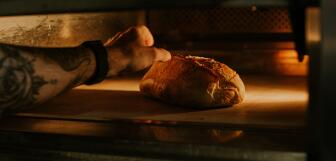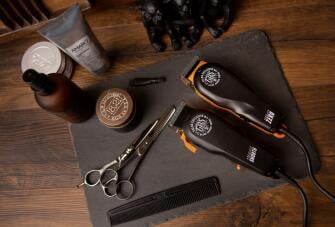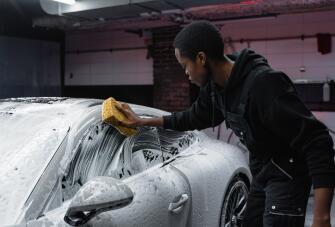Equipment Needed to Start a Bakery: A Complete List
That's right, whether you're a seasoned professional or just starting out, having the right bakery equipment is crucial to your business model. Not only will it ensure that your baked goods come out perfectly every time, but it can also save you time and money in the long run.
So, if you're ready to take your bakery business to the next level, sit back, grab a cup of coffee, and let's dive into the baking equipment needed to start a bakery. From baking tools and utensils to ovens and appliances, and even specialty bakery equipment for those fancier creations, we've got you covered with all you need to add to your “buy now” list. Plus, we’ve got nine tips for sourcing and buying bakery equipment too. Let's get started!
Essential bakery equipment for your business
When it comes to starting a bakery, having the right baking equipment is crucial. In this section, we'll break down the essential bakery equipment you'll need to get started.
Baking tools and utensils:
Baking tools and utensils are the backbone of any bakery operation. Here are some of the must-have items for your bakery business:
- Measuring cups and spoons: Essential for precise measurements.
- Mixing bowls: For mixing ingredients and creating batters and doughs.
- Rubber spatulas: Great for scraping down the sides of bowls and folding ingredients.
- Whisks: For blending ingredients and creating airy batters.
- Flour sifters: used for sifting flour
- Rolling pins: Used for rolling out dough for pastries, pies, and other delicious baked goods.
- Pastry bags and tips: Essential for decorating cakes and pastries.
- Bench scrapers: Perfect for cutting dough and cleaning work surfaces.
- Pastry brushes: Used for glazing pastries, brushing on egg wash, and more.
Restaurant equipment required:
Depending on the size and scope of your bakery business, you may need some additional equipment typically found in a restaurant setting. Here are some of the most common types of restaurant equipment:
- Commercial mixers: Used for large-scale mixing of dough, batter, and other ingredients.
- Proofing cabinets: A large-scale alternative to a proofer, used for allowing dough to rise in a controlled environment.
- Food processors: Great for chopping, pureeing, and mixing ingredients.
- Dishwashers: Used for cleaning dishes, utensils, and equipment quickly and efficiently.
Having this type of equipment can help you handle high volume orders and keep up with customer demand. Plus, it adds an extra level of professionalism to your bakery.
Cleaning equipment needed to start a bakery:
It's essential to keep a clean and hygienic environment in any bakery. That's why investing in cleaning equipment is a must. Here are some of the most important pieces of cleaning equipment:
- Cleaning supplies: Basic cleaning supplies like sponges, cleaning solutions, and disinfectants are a must-have for maintaining a clean bakery.
- Trash cans and liners: Used for disposing of waste and keeping the bakery free of clutter.
- Mops and brooms: For cleaning floors and sweeping up crumbs and debris.
- Gloves and hairnets: Safety equipment that helps prevent contamination of food products.
- Cleaning machines: For larger bakeries, investing in cleaning machines like floor scrubbers and steam cleaners can help keep the bakery spotless.
Maintaining a clean and hygienic environment is essential for the health and safety of your customers, and can also help keep your bakery running smoothly.
Ovens and appliances:
A bakery wouldn't be complete without the right ovens and appliances. Here are some of the most important:
- Convection oven: This type of oven circulates hot air for even baking.
- Deck oven: Used for baking bread and other baked goods.
- Proofer: Creates a warm, humid environment for bread dough to rise.
- Microwave: Great for quickly melting ingredients.
- Refrigerator: Used for storing ingredients and finished products.
- Freezer: Great for freezing dough, pastry, and other ingredients.
Baking pans and molds:
Baking pans and molds are essential for creating all kinds of baked goods, and come in a variety of sizes. Here are some of the most common types:
- Sheet pans: Used for baking cookies, sheet cakes, and more.
- Cake pans: Essential for baking cakes of all shapes and sizes.
- Muffin tins: Perfect for baking muffins and cupcakes.
- Loaf pans: Used for baking breads and loaf cakes.
- Tart pans: Great for making tarts and quiches.
- Pie plates: Essential for making pies.
- Donut pans: Used for making baked donuts.
Miscellaneous equipment needed to start a bakery:
There are some more items that can come in handy for a bakery:
- Cooling racks: Used for cooling baked goods and preventing them from becoming soggy.
- Bread slicer: Used for slicing bread quickly and evenly.
- Pastry cutters: Great for cutting pastry dough into shapes.
- Dough dividers: Essential for dividing dough into equal portions.
- Digital scales: Used for precise measurements when baking.
Bakery technology needed:
Technology is becoming increasingly important in the world of baking. Investing in the right tech can help streamline operations and increase efficiency. Here are two types of tech that can benefit any bakery:
- Bakery Point of Sale (POS): A Point of Sale (POS) system is a software and hardware combination that allows businesses to manage transactions and track sales. In a bakery setting, a POS system can help you keep track of inventory and sales, as well as manage employee schedules and generate reports. Some bakery POS systems also come with additional features, such as customer loyalty programs and online ordering.
- Kitchen Display System (KDS): A KDS is a digital display that replaces traditional paper tickets in a kitchen setting. Instead of printing out orders, tickets are sent directly to the KDS, where they can be viewed by bakery kitchen staff. This can help reduce errors and increase efficiency, as staff can easily see what orders need to be fulfilled and in what order.
Epos Now Complete Solution: The Best for Business
Delight staff and customers alike with one-tap ordering, omnichannel sales and real-time reporting so you can respond instantly on those busy days.
9 tips for sourcing and buying bakery equipment
When it comes to sourcing and buying bakery equipment, there are a few things you should keep in mind to ensure you get the best value for your money. Here are some tips to help you make the most of your investment:
Tip 1 - Start with a plan
When it comes to starting a bakery, it's important to have a solid plan in place. A business plan that outlines your vision for the bakery, as well as your goals and objectives, can help you stay focused and make informed decisions about your equipment purchases.
One of the first things you'll want to consider is the type of bakery you want to run. Do you want to specialize in bread or pastries? Will you offer custom cakes or catering services? Once you have a clear idea of what your bakery will focus on, you can begin to think about the equipment you'll need.
For example, if you plan to specialize in bread, you'll need a reliable commercial mixer, a proofing cabinet, and a deck oven. On the other hand, if you plan to focus on pastries, you may need a convection oven, a pastry case, and a dough sheeter.
The other side of your plan is being practical about the space available and your budget. If you want a huge commercial convection oven, an industrial-sized dishwasher, three fridges, storage space, and still have room for a multi-deck display and seating for all your customers, you’ve got to have the space and money. Measure up your space to know exactly what you’re working with, and then buy the right-sized items - this will also help you manage your budget.
Tip 2 - Do your research
Buying bakery equipment should be a fun and exciting process, but it's important to approach it with a bit of caution. That's why doing your research is crucial for finding the equipment that will work best for your business.
The first place to start your research is online. Check out reviews and ratings from other bakery owners and industry experts. You can even join online communities or forums where bakers gather to swap tips and tricks. It's a great way to connect with others and learn from their experiences.
But don't stop there! It's also a good idea to visit local restaurant supply stores. Not only can you check out the equipment up close and personal, but you can also chat with the salespeople and ask them any questions you might have.
When doing your research, keep your budget in mind. Don't be afraid to ask for advice from other bakers or the salespeople at the restaurant supply store. They can help guide you to equipment that fits your budget and your needs.
Tip 3 - Get your money's worth with used equipment (But be smart about it!)
Starting a bakery can be expensive, and buying brand-new equipment can really add up quickly. That's why considering used equipment is a smart move for many business owners. Not only can you save some cash, but you can also get high-quality equipment that still has a lot of life left in it.
But before you go diving into the world of used equipment, there are a few things to keep in mind. First, make sure to inspect any equipment thoroughly before you buy it. You don't want to get stuck with a mixer that doesn't mix or an oven that doesn't bake. Ask to see the equipment in action if possible, and look for any signs of wear and tear or damage.
Another thing to consider is that used equipment may not come with a warranty. This means that if something goes wrong with the equipment, you'll be on the hook for repairs or replacements. To avoid this, ask the seller if there are any warranties or guarantees that come with the equipment, or consider purchasing a warranty separately.
Lastly, don't be afraid to haggle a bit when it comes to buying used equipment. The seller may be willing to negotiate on price, especially if the equipment has been on the market for a while.
Tip 4 - Save money and energy with energy-efficient equipment
In addition to buying used equipment, another way to save money when starting a bakery is to look for energy-efficient options. These types of equipment can help you reduce your energy usage and save money on your bills over time.
When shopping for equipment, look for products with the ENERGY STAR label. This certification means that the equipment meets strict energy efficiency guidelines set by the U.S. Environmental Protection Agency. By choosing ENERGY STAR-certified equipment, you can ensure that you're getting the most energy-efficient option available.
But don't just stop at ENERGY STAR certification. Be sure to also look for other features that can help save energy, such as programmable settings, high-efficiency motors, and improved insulation. By investing in energy-efficient equipment, you'll not only save money in the long run, but you'll also be doing your part for the environment.
Tip 5 - Stay safe with certified equipment
As a bakery owner, the safety of your customers and employees should be a top priority. That's why it's important to choose equipment that meets safety standards. One way to do this is to look for equipment that has been certified by organizations like NSF International or Underwriters Laboratories (UL).
NSF International is an independent organization that tests and certifies equipment to ensure that it meets strict safety and sanitation standards. UL is another organization that certifies equipment to ensure that it meets electrical safety standards.
By choosing equipment that has been certified by one of these organizations, you can have peace of mind knowing that your equipment is safe to use. Plus, some local health departments may require certification from these organizations in order to approve your bakery for operation. So, be sure to do your research and choose equipment that is certified and up to safety standards.
Tip 6 - Save money and conserve cash flow with leasing
Starting a bakery can be a big financial investment, and it's not always easy to come up with the money to buy all the equipment you need upfront. That's where leasing comes in as a good option to consider.
Leasing equipment allows you to use the equipment you need without having to pay for it all upfront. Instead, you'll make monthly payments over a set period of time. This can be a great way to conserve your cash flow and keep your startup costs low.
Additionally, leasing can also have tax benefits. Because the monthly lease payments are considered a business expense, they can be deducted from your taxable income. This can help you save even more money in the long run.
Before you decide to lease, be sure to carefully read and understand the terms of the lease agreement. Make sure you're aware of any fees or penalties that may apply if you end the lease early or if the equipment is damaged. With careful consideration and proper research, leasing can be a smart way to get the equipment you need to start your bakery.
Tip 7 - Keep your bakery equipment running smoothly with regular maintenance
After you've invested in all the necessary bakery equipment, the last thing you want is for it to break down or malfunction. That's why it's important to have a plan in place for regular maintenance and repairs.
Regular maintenance can help extend the lifespan of your equipment, prevent unexpected breakdowns, and ensure that your equipment is running at peak efficiency. This can save you money in the long run by avoiding costly repairs or replacements.
Make sure to read the manufacturer's instructions for recommended maintenance schedules and follow them accordingly. It's also a good idea to keep a record of all maintenance and repairs, so you can easily track when services were performed and anticipate future maintenance needs.
In addition to regular maintenance, make sure to factor in the cost of repairs when budgeting for equipment. This way, you won't be caught off guard by unexpected repair bills.
Tip 8 - Try before you buy: tTest equipment to ensure it meets your needs
It's important to make sure that the bakery equipment you're interested in buying will meet your needs before you make a purchase. That's why it's a good idea to test out the equipment first. Ask the seller if you can see a demonstration of the equipment or try it out for yourself.
Testing the equipment will give you a better idea of how it works and whether it's the right fit for your bakery. You'll be able to see firsthand how easy it is to use, whether it produces the desired results, and whether it's the right size and configuration for your space.
By testing equipment, before you buy, you can avoid making costly mistakes and ensure that you're making the best possible investment for your business. Don't be afraid to ask questions, and take your time to make the right decision.
Tip 9 - Don't overspend on equipment
While it's important to invest in quality equipment, it's also important to stay within your budget. Don't overspend on equipment that you don't really need, and consider purchasing used or refurbished equipment to save money.
In summary, sourcing and buying bakery equipment requires careful consideration of a variety of factors. Make sure you test equipment before buying, consider the availability of replacement parts, and look for multi-functional equipment to save space and money. Don't overspend on equipment, and be sure to factor in maintenance costs when budgeting. With these tips in mind, you'll be able to make informed decisions about your bakery equipment purchases.
Rise to the occasion: wrapping up your bakery equipment shopping
Congratulations, you've made it through our complete guide on the equipment needed to start a bakery! By now, you should have a good understanding of the essential equipment required to run a successful bakery business, as well as some tips for sourcing and buying the best equipment for your needs.
Remember, buying bakery equipment is a big investment, so take your time and do your research to find the best options for your business. Whether you're shopping for ovens, mixers, or pastry bags, make sure you consider your budget, space requirements, and the specific needs of your bakery.
And don't forget to have fun! Starting a bakery business is an exciting adventure, and having specialized equipment can make all the difference. With a little creativity and a lot of passion, you can turn your bakery dreams into reality.
So, get ready to roll in dough and start baking up a storm with your new bakery equipment. Happy baking!
For more information on how to open, run and manage a bakery check out our additional resources below:



